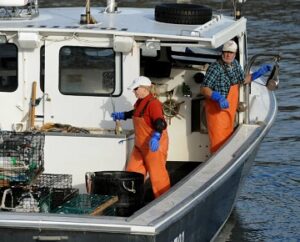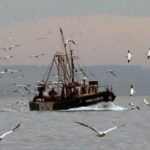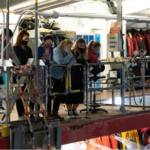Tag Archives: Maine Department of Marine Resources
Maine: Judge dismisses case against the state challenging lobster boat tracking rules
![]() A federal judge has ruled against a group of five lobstermen that sued the state in attempt to stop electronic boat tracking requirements that went effect almost one year ago. The rules require lobstermen with federal fishing permits to install monitors on their boats that track their location on the water. The fishermen argued that they should not be subject to monitoring at all times. They often use their boats for other purposes beyond commercial lobstering, which Woodcock acknowledged. The boat tracking requirements will stay in place for now. But in his decision, Woodcock said the lobstermen had raised important Fourth Amendment questions and encouraged them to appeal the case. more, >>CLICK TO READ<< 11:21
A federal judge has ruled against a group of five lobstermen that sued the state in attempt to stop electronic boat tracking requirements that went effect almost one year ago. The rules require lobstermen with federal fishing permits to install monitors on their boats that track their location on the water. The fishermen argued that they should not be subject to monitoring at all times. They often use their boats for other purposes beyond commercial lobstering, which Woodcock acknowledged. The boat tracking requirements will stay in place for now. But in his decision, Woodcock said the lobstermen had raised important Fourth Amendment questions and encouraged them to appeal the case. more, >>CLICK TO READ<< 11:21
2024 Maine Scallop License Lottery Winners Announced
 The Maine Department of Marine Resources (DMR) has announced the latest winners of the state’s scallop license lotteries. Each winner is responsible for applying for a license within 30 days of notification. The new licenses are the result of a limited entry system established by the legislature and implemented through regulation in June 2018 that allows someone who did not hold a scallop license in the previous year to be eligible for one. This year there were 74 entries for dive licenses and 1,095 entries for drag licenses. With $35 of each lottery entry fee deposited into DMR’s Scallop Research Fund, a total of $40,915 was raised to support scallop research and management. The winners include the following. more, >>CLICK TO READ<< 09:24
The Maine Department of Marine Resources (DMR) has announced the latest winners of the state’s scallop license lotteries. Each winner is responsible for applying for a license within 30 days of notification. The new licenses are the result of a limited entry system established by the legislature and implemented through regulation in June 2018 that allows someone who did not hold a scallop license in the previous year to be eligible for one. This year there were 74 entries for dive licenses and 1,095 entries for drag licenses. With $35 of each lottery entry fee deposited into DMR’s Scallop Research Fund, a total of $40,915 was raised to support scallop research and management. The winners include the following. more, >>CLICK TO READ<< 09:24
Bottom Trawl Survey of the Maine Research Array Wind Energy Area Postponed to Allow for Testing of Survey Method
 This notice is to inform you that the bottom trawl survey of the Maine Research Array Wind Energy (MeRA) Area previously scheduled to begin on October 15, 2024, has been postponed until a date to be determined in early 2025. DMR will use this additional time to continue to test and refine our survey methodology. Between October 15 and November 27, DMR will spend 2-5 days testing the trawl vessel’s gear configuration and performance. This will include a one-day test cruise to the MeRA area and an additional one to four days of test tows as needed to assess and optimize the survey’s gear performance. Any additional testing will occur in federal waters outside of the proposed MeRA sampling area. Links, more, >>CLICK TO READ<< 16:16
This notice is to inform you that the bottom trawl survey of the Maine Research Array Wind Energy (MeRA) Area previously scheduled to begin on October 15, 2024, has been postponed until a date to be determined in early 2025. DMR will use this additional time to continue to test and refine our survey methodology. Between October 15 and November 27, DMR will spend 2-5 days testing the trawl vessel’s gear configuration and performance. This will include a one-day test cruise to the MeRA area and an additional one to four days of test tows as needed to assess and optimize the survey’s gear performance. Any additional testing will occur in federal waters outside of the proposed MeRA sampling area. Links, more, >>CLICK TO READ<< 16:16
NOTICE: Bottom Trawl Survey of the Maine Research Array Wind Energy Area
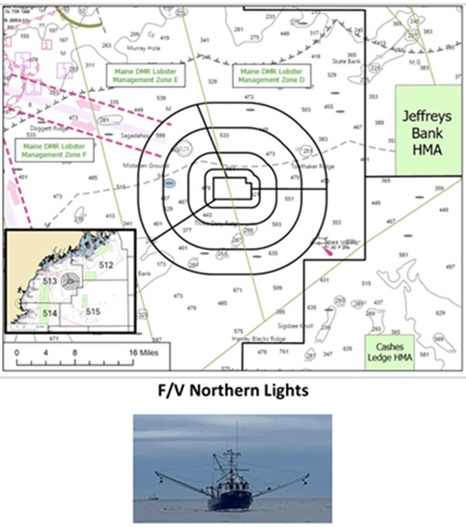 Maine Department of Marine Resources sent this bulletin at 09/23/2024 12:15 PM EDT. more, >>CLICK TO READ<< 12:36
Maine Department of Marine Resources sent this bulletin at 09/23/2024 12:15 PM EDT. more, >>CLICK TO READ<< 12:36
No one stopping Maine fishers from poaching N.B. lobster: group
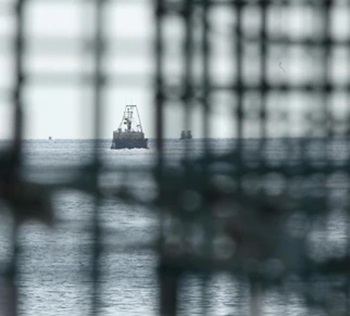 Amanda Johnson, executive director of the Fundy North Fishermen’s Association, says a border boundary dispute has long seen U.S. fishermen sneaking across from Maine to set traps inside Canadian waters. But she says it’s now not being stopped as Canadian fisheries officers aren’t conducting enforcement patrols. That has Johnson worried about overfishing ahead of the New Brunswick south shore’s November lobster fishing season, but also for the safety of New Brunswick fishers fearing the potential for looming confrontations on the water. “Right now, the main issue is that there are no fisheries officers patrolling the water in southwest New Brunswick,” Johnson said. “They are kind of on strike, same as they are in southwest Nova Scotia, and DFO isn’t really disclosing who is on strike and who isn’t. more, >>CLICK TO READ<< 18:15
Amanda Johnson, executive director of the Fundy North Fishermen’s Association, says a border boundary dispute has long seen U.S. fishermen sneaking across from Maine to set traps inside Canadian waters. But she says it’s now not being stopped as Canadian fisheries officers aren’t conducting enforcement patrols. That has Johnson worried about overfishing ahead of the New Brunswick south shore’s November lobster fishing season, but also for the safety of New Brunswick fishers fearing the potential for looming confrontations on the water. “Right now, the main issue is that there are no fisheries officers patrolling the water in southwest New Brunswick,” Johnson said. “They are kind of on strike, same as they are in southwest Nova Scotia, and DFO isn’t really disclosing who is on strike and who isn’t. more, >>CLICK TO READ<< 18:15
Scientists plan climate engineering experiment in ocean off Cape Cod
 Scientists from the Woods Hole Oceanographic Institution are seeking a federal permit to experiment in the waters off Cape Cod and see if tweaking the ocean’s chemistry could help slow climate change. If the project moves forward, it will likely be the first ocean field test of this technology in the U.S. But the plan faces resistance from both environmentalists and the commercial fishing industry. The scientists want to disperse 6,600 gallons of sodium hydroxide — a strong base — into the ocean about 10 miles south of Martha’s Vineyard. Groups including the Stellwagen Bank Charter Boat Association, the Massachusetts Lobstermen’s Association and the Maine Department of Marine Resources have expressed concerns about, or outright opposition to the project. more, >>CLICK TO READ<< 09:52
Scientists from the Woods Hole Oceanographic Institution are seeking a federal permit to experiment in the waters off Cape Cod and see if tweaking the ocean’s chemistry could help slow climate change. If the project moves forward, it will likely be the first ocean field test of this technology in the U.S. But the plan faces resistance from both environmentalists and the commercial fishing industry. The scientists want to disperse 6,600 gallons of sodium hydroxide — a strong base — into the ocean about 10 miles south of Martha’s Vineyard. Groups including the Stellwagen Bank Charter Boat Association, the Massachusetts Lobstermen’s Association and the Maine Department of Marine Resources have expressed concerns about, or outright opposition to the project. more, >>CLICK TO READ<< 09:52
More alewives swim up the restored Bagaduce watershed
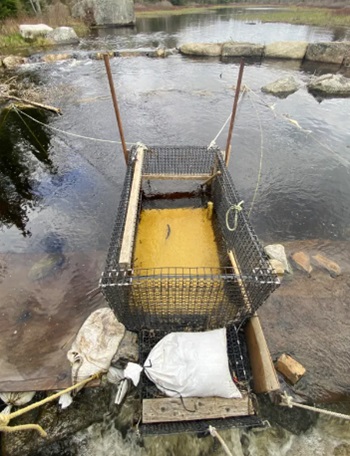 More than two years after the completion of multiple fish passage projects in western Hancock County, the effort appears to be paying off as alewives swim in greater numbers up the Bagaduce River watershed each spring. Those and other projects have contributed to a resurgence in the upstream migration of alewives, which are a key food supply for bigger wildlife, as well as a growing source of income for Maine fishermen who sell them as food or springtime lobster bait. From 2017 through 2021, the towns of Penobscot, Sedgwick and Brooksville worked with conservation groups to remove barriers that prevented fish from migrating between the tidal Bagaduce River and five ponds in its watershed. The idea was to help restore runs for fish, especially alewives, that travel upstream from Penobscot Bay and reproduce in the ponds more, >>CLICK TO READ<< 14:55
More than two years after the completion of multiple fish passage projects in western Hancock County, the effort appears to be paying off as alewives swim in greater numbers up the Bagaduce River watershed each spring. Those and other projects have contributed to a resurgence in the upstream migration of alewives, which are a key food supply for bigger wildlife, as well as a growing source of income for Maine fishermen who sell them as food or springtime lobster bait. From 2017 through 2021, the towns of Penobscot, Sedgwick and Brooksville worked with conservation groups to remove barriers that prevented fish from migrating between the tidal Bagaduce River and five ponds in its watershed. The idea was to help restore runs for fish, especially alewives, that travel upstream from Penobscot Bay and reproduce in the ponds more, >>CLICK TO READ<< 14:55
State backs lobstermen in urging regulators to reevaluate changes to minimum size
 The rules, which are set to go into effect on Jan. 1, 2025, will increase the minimum size from 3 1/4 inches to 3 5/16 inches, on the gauges that lobstermen use to measure lobsters and determine whether they are allowed to harvest them. A second increase would take effect two years later, bringing the minimum to 3 3/8 inches. The rules also affect the vents in traps that allow undersized lobsters to escape. The Atlantic States Marine Fisheries Commission says it is making the changes to preserve the long-term future of the lobster population in the Gulf of Maine, which federal data show has sharply dropped. Lobstermen also question the accuracy of the federal data – saying that it was corrected over a small and abnormal time frame that doesn’t indicate the reality of population trends. more, >>CLICK TO READ<< 06:23
The rules, which are set to go into effect on Jan. 1, 2025, will increase the minimum size from 3 1/4 inches to 3 5/16 inches, on the gauges that lobstermen use to measure lobsters and determine whether they are allowed to harvest them. A second increase would take effect two years later, bringing the minimum to 3 3/8 inches. The rules also affect the vents in traps that allow undersized lobsters to escape. The Atlantic States Marine Fisheries Commission says it is making the changes to preserve the long-term future of the lobster population in the Gulf of Maine, which federal data show has sharply dropped. Lobstermen also question the accuracy of the federal data – saying that it was corrected over a small and abnormal time frame that doesn’t indicate the reality of population trends. more, >>CLICK TO READ<< 06:23
Warming Waters Heat Summer’s Feast Well Before It Gets to the Kitchen
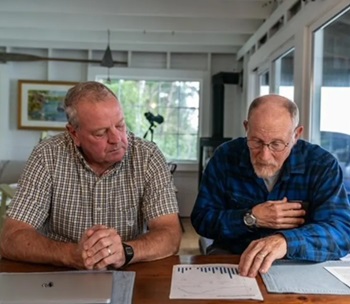 An ever-warming planet is playing havoc with the intricately interconnected web of marine life. Just as climate has long stressed human populations and driven migration, marine populations are stressed and in search of survivable climates too. In New England, scientists and lobstermen alike are studying and living the impacts. Tim Alley has been lobstering in Maine’s coastal waters for 40 years. “There’s been a trend in recent years related to temperatures,” he says. Alley is steeped in the traditions of his home state’s biggest industry and recently dusted off a short film from 1972 in which he starred at age 12, “Alone in My Lobster Boat,” filmed in South Bristol and New Harbor, Maine. Like most lobstermen, he would call himself an environmentalist: they live on the water, they live from the water, they thrive on the water. But they reject the notion that a species – the right whale – is failing because of them. Over 40 years, he says, he has seen exactly one right whale. Photos, Video, more, >>CLICK TO READ<< 14:50
An ever-warming planet is playing havoc with the intricately interconnected web of marine life. Just as climate has long stressed human populations and driven migration, marine populations are stressed and in search of survivable climates too. In New England, scientists and lobstermen alike are studying and living the impacts. Tim Alley has been lobstering in Maine’s coastal waters for 40 years. “There’s been a trend in recent years related to temperatures,” he says. Alley is steeped in the traditions of his home state’s biggest industry and recently dusted off a short film from 1972 in which he starred at age 12, “Alone in My Lobster Boat,” filmed in South Bristol and New Harbor, Maine. Like most lobstermen, he would call himself an environmentalist: they live on the water, they live from the water, they thrive on the water. But they reject the notion that a species – the right whale – is failing because of them. Over 40 years, he says, he has seen exactly one right whale. Photos, Video, more, >>CLICK TO READ<< 14:50
Maine lobstermen struggle to adapt to new electronic reporting rules. Their licenses are on the line.
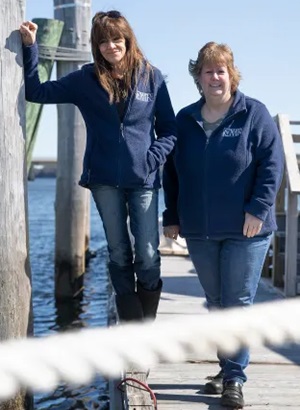 Alice Mayberry and Sue Kelley spend most of their days talking to lobstermen about what they’ve hauled in. Mayberry is riffling through paper logs. Kelley is texting until 9 p.m. Then, they both log onto the Maine Department of Marine Resources’ database and plug in what the lobstermen did for the day. Over the last several years, state and federal regulators started requiring more fishermen to report what they caught, and where. A few years ago, only a portion of harvesters needed to submit that information, and it could be sent in on a piece of paper. Now, all fishermen who harvest 15 species of fish – pogies, scallops, lobster, halibut, mussels, eels and others – have to file their landings electronically. Fishermen in Maine are gradually learning what they’re supposed to do. For lobstermen, adjusting has been particularly hard. Audio, more, >>click to read<< 15:58
Alice Mayberry and Sue Kelley spend most of their days talking to lobstermen about what they’ve hauled in. Mayberry is riffling through paper logs. Kelley is texting until 9 p.m. Then, they both log onto the Maine Department of Marine Resources’ database and plug in what the lobstermen did for the day. Over the last several years, state and federal regulators started requiring more fishermen to report what they caught, and where. A few years ago, only a portion of harvesters needed to submit that information, and it could be sent in on a piece of paper. Now, all fishermen who harvest 15 species of fish – pogies, scallops, lobster, halibut, mussels, eels and others – have to file their landings electronically. Fishermen in Maine are gradually learning what they’re supposed to do. For lobstermen, adjusting has been particularly hard. Audio, more, >>click to read<< 15:58
Sixteen Mainers Win a Chance to Enter Lucrative Elver Fishery
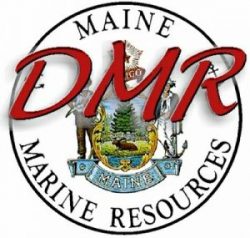 The Maine Department of Marine Resources has awarded the right to apply for an elver license to sixteen Mainers who were among more than 4,500 who entered a license lottery held by the department. Maine’s elver fishery continues to be one of Maine’s most lucrative, with a per pound value of $2,009 last year, which generated more than $19 million for fishermen. As was the case in 2022, each new license holder will receive four pounds of quota, which is made available from individual quota associated with licenses that were not renewed. They will each be authorized to choose either a dip net or a fyke net for harvesting. The lottery winners are,,, The Department has notified the winners, who have thirty days to apply for a license. This year’s elver season begins at noon on March 22 and goes until noon on June 7. more, >>click to read<< 15:41
The Maine Department of Marine Resources has awarded the right to apply for an elver license to sixteen Mainers who were among more than 4,500 who entered a license lottery held by the department. Maine’s elver fishery continues to be one of Maine’s most lucrative, with a per pound value of $2,009 last year, which generated more than $19 million for fishermen. As was the case in 2022, each new license holder will receive four pounds of quota, which is made available from individual quota associated with licenses that were not renewed. They will each be authorized to choose either a dip net or a fyke net for harvesting. The lottery winners are,,, The Department has notified the winners, who have thirty days to apply for a license. This year’s elver season begins at noon on March 22 and goes until noon on June 7. more, >>click to read<< 15:41
Maine commercial fisheries jump $25M in value, with strong boat price for lobster
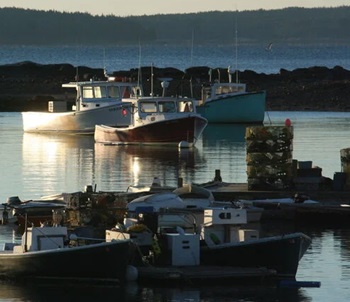 Commercial fishermen in Maine had a strong year in 2023. The value of the state’s fisheries increased by more than $25 million over 2022, for a total of $611.3 million at the dock, according to preliminary data released by the Maine Department of Marine Resources. The department attributed much of the increase to a strong boat price for lobster, Maine’s most valuable species last year. The price paid to fishermen went from $3.97 per pound in 2022 to $4.95 per pound in 2023, netting harvesters an additional $72 million compared to the previous year, for a total value in 2023 of $464.4 million. “The price Maine lobstermen received last year is a reflection of the continued strong demand for this iconic seafood,” said Patrick Keliher, the department’s commissioner. more, >>click to read<< 10:19
Commercial fishermen in Maine had a strong year in 2023. The value of the state’s fisheries increased by more than $25 million over 2022, for a total of $611.3 million at the dock, according to preliminary data released by the Maine Department of Marine Resources. The department attributed much of the increase to a strong boat price for lobster, Maine’s most valuable species last year. The price paid to fishermen went from $3.97 per pound in 2022 to $4.95 per pound in 2023, netting harvesters an additional $72 million compared to the previous year, for a total value in 2023 of $464.4 million. “The price Maine lobstermen received last year is a reflection of the continued strong demand for this iconic seafood,” said Patrick Keliher, the department’s commissioner. more, >>click to read<< 10:19
Maine lobstermen made more money in 2023 despite catching fewest lobster in 15 years
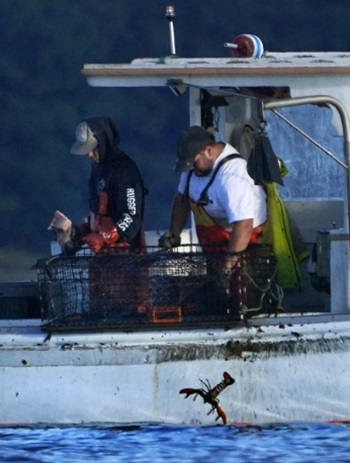 Maine lobstermen raked in $464.4 million at the docks last year, rebounding from the worst year the fishery had seen in a decade, according to an annual report from the Maine Department of Marine Resources released Friday. The dwindling number of landings isn’t necessarily a surprise, though. State officials and members of the lobstering community say the decrease reflects the impacts of high costs to operate the fishery last year. And the dip in poundage indicates how lobstermen navigated the challenging obstacles.“Fishermen are now very strategic about how they fish. Expenses are through the roof, so you can’t afford to be out if you’re not making money,” said Patrice McCarron, a lobsterman and policy director with the Maine Lobstermen’s Association. more, >>click to read<< 16:26
Maine lobstermen raked in $464.4 million at the docks last year, rebounding from the worst year the fishery had seen in a decade, according to an annual report from the Maine Department of Marine Resources released Friday. The dwindling number of landings isn’t necessarily a surprise, though. State officials and members of the lobstering community say the decrease reflects the impacts of high costs to operate the fishery last year. And the dip in poundage indicates how lobstermen navigated the challenging obstacles.“Fishermen are now very strategic about how they fish. Expenses are through the roof, so you can’t afford to be out if you’re not making money,” said Patrice McCarron, a lobsterman and policy director with the Maine Lobstermen’s Association. more, >>click to read<< 16:26
Maine’s lobster fishermen struggle with efforts to save right whales
 Willis Spear stands in the backyard of his Yarmouth, Maine home. Behind him are dozens of yellow and green lobster traps. Spear, 67, spends most of the winter preparing these traps to be deployed in the Gulf of Maine come April. It’s a task this lifelong lobster fisherman has carried out each year since he was a child. “The water gives us life,” Spear said on an unusually warm winter day in late February. Over the last decade, lobster fishermen in Maine have faced increasingly stronger financial headwinds, from the price of fuel to the revenue they are receiving for the lobster themselves. The lobster-fishing industry generates hundreds of millions of dollars for Maine’s economy each year. Video, more, >>click to read<< 18:37
Willis Spear stands in the backyard of his Yarmouth, Maine home. Behind him are dozens of yellow and green lobster traps. Spear, 67, spends most of the winter preparing these traps to be deployed in the Gulf of Maine come April. It’s a task this lifelong lobster fisherman has carried out each year since he was a child. “The water gives us life,” Spear said on an unusually warm winter day in late February. Over the last decade, lobster fishermen in Maine have faced increasingly stronger financial headwinds, from the price of fuel to the revenue they are receiving for the lobster themselves. The lobster-fishing industry generates hundreds of millions of dollars for Maine’s economy each year. Video, more, >>click to read<< 18:37
Data show fewer baby lobsters but fishermen say ‘eggers’ abound
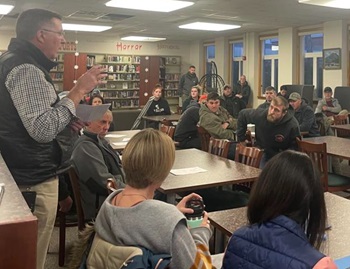 Lobstermen and the agency that oversees them, the Maine Department of Marine Resources (DMR), sparred a little over state data on lobster populations that lobstermen said does not reflect what they see when fishing, when the Zone B Lobster Council met Feb. 21 at the Mount Desert Island High School library. The DMR estimates the number of baby lobsters, called “year of young,” through trawl and ventless trap surveys to project future adult populations and manage the fishery — and to adhere to interstate fishery rules from the Atlantic States Marine Fisheries Commission (ASMFC), an interstate board managing fisheries for 15 states, including Maine. 3 Photos, more, >>click to read<< 12:45
Lobstermen and the agency that oversees them, the Maine Department of Marine Resources (DMR), sparred a little over state data on lobster populations that lobstermen said does not reflect what they see when fishing, when the Zone B Lobster Council met Feb. 21 at the Mount Desert Island High School library. The DMR estimates the number of baby lobsters, called “year of young,” through trawl and ventless trap surveys to project future adult populations and manage the fishery — and to adhere to interstate fishery rules from the Atlantic States Marine Fisheries Commission (ASMFC), an interstate board managing fisheries for 15 states, including Maine. 3 Photos, more, >>click to read<< 12:45
Maine lobster industry reacts to right whale found entangled in rope
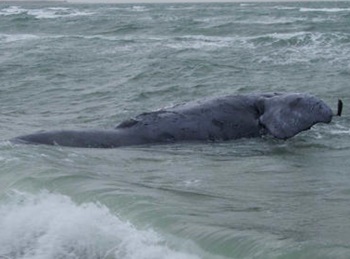 Maine’s lobster industry is responding following the discovery of a dead North Atlantic right whale near Martha’s Vineyard last month. According to federal authorities, the whale was entangled in fishing rope, including portions traced back to Maine. While NOAA has yet to determine the exact cause of the whale’s demise, Maine lobstermen are fearing potential blame. “They’re going to say that the rope, you know, caused harm to the whale, and over time, it just was a very slow death,” said John Drouin, a Lobsterman from Cutler with over 40 years of experience. The incident marks the first documented interaction between a right whale and Maine fishing gear in over two decades. more, >>click to read<< 11:49
Maine’s lobster industry is responding following the discovery of a dead North Atlantic right whale near Martha’s Vineyard last month. According to federal authorities, the whale was entangled in fishing rope, including portions traced back to Maine. While NOAA has yet to determine the exact cause of the whale’s demise, Maine lobstermen are fearing potential blame. “They’re going to say that the rope, you know, caused harm to the whale, and over time, it just was a very slow death,” said John Drouin, a Lobsterman from Cutler with over 40 years of experience. The incident marks the first documented interaction between a right whale and Maine fishing gear in over two decades. more, >>click to read<< 11:49
New England Fishermen Fear NOAA Retaliation as Feds Pin Dead Whale on Maine Lobstermen
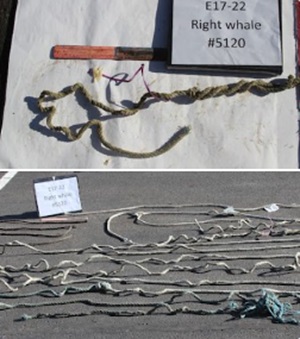 For the first time in twenty years, the death of a North Atlantic Right Whale has been linked to Maine fishing gear, according to a federal environmental agency. Found dead off of Martha’s Vineyard on January 28 near Joseph Sylvia State Beach, the juvenile, female whale was described as having been entangled in a rope that was “deeply embedded in the tail.” According to the U.S. Commerce Department’s National Oceanic and Atmospheric Administration (NOAA) — parent agency of the National Marine Fisheries Service (NMFS) — the rope found on the whale contained purple markings that are consistent with water trap and pot buoy lines used by lobstermen in Maine. Photos, more, >>click to read<< 07:22
For the first time in twenty years, the death of a North Atlantic Right Whale has been linked to Maine fishing gear, according to a federal environmental agency. Found dead off of Martha’s Vineyard on January 28 near Joseph Sylvia State Beach, the juvenile, female whale was described as having been entangled in a rope that was “deeply embedded in the tail.” According to the U.S. Commerce Department’s National Oceanic and Atmospheric Administration (NOAA) — parent agency of the National Marine Fisheries Service (NMFS) — the rope found on the whale contained purple markings that are consistent with water trap and pot buoy lines used by lobstermen in Maine. Photos, more, >>click to read<< 07:22
Maine Lobstermen Ask Court to Block State Agency from Enforcing a 24-Hour Location Monitoring Mandate Pending the Resolution of Their Lawsuit
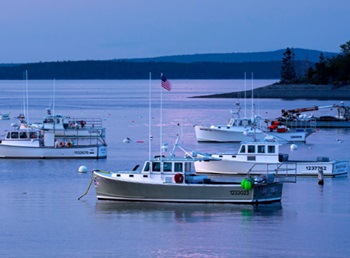 A group of Maine lobstermen have asked the United States District Court for the District of Maine to temporarily block state officials from enforcing the controversial requirement that lobstering boats be equipped with a 24-hour location monitoring system. At the beginning of January, five Maine lobstermen filed a lawsuit against the Maine Department of Marine Resources (MDMR) Commissioner Patrick Keliher, alleging violations of their Fourth and Fourteenth Amendment rights. “Before the Court is an unprecedented regulation that, if permitted to stand, would require federally permitted Maine lobster fishermen to install a tracking device on their fishing vessels that would monitor their movements on a minute-by-minute basis (and every six hours when the vessel is moored) ‘regardless of landing state, trip type, location fished or target species,’” the motion reads. more, >>click to read<< 06:44
A group of Maine lobstermen have asked the United States District Court for the District of Maine to temporarily block state officials from enforcing the controversial requirement that lobstering boats be equipped with a 24-hour location monitoring system. At the beginning of January, five Maine lobstermen filed a lawsuit against the Maine Department of Marine Resources (MDMR) Commissioner Patrick Keliher, alleging violations of their Fourth and Fourteenth Amendment rights. “Before the Court is an unprecedented regulation that, if permitted to stand, would require federally permitted Maine lobster fishermen to install a tracking device on their fishing vessels that would monitor their movements on a minute-by-minute basis (and every six hours when the vessel is moored) ‘regardless of landing state, trip type, location fished or target species,’” the motion reads. more, >>click to read<< 06:44
Maine fishermen look to rebuild higher after harbors took ‘a real beating’
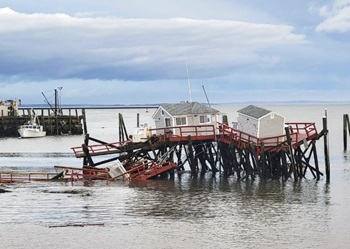 Working waterfront property owners along the entire Maine coast witnessed destruction as extreme winds and storm surge flooded buildings, set some adrift and tore docks apart. Some already are planning to rebuild — with sturdier and maybe higher piers in mind as they consider the future — but it’s too early to tell how long it will take and how much it might cost. Commercial lobster docks where fishermen offload and sell their catch were damaged in Milbridge, Corea, Southwest Harbor, Stonington and New Harbor, to name a few places. photos, more, >>click to read<< 07:07
Working waterfront property owners along the entire Maine coast witnessed destruction as extreme winds and storm surge flooded buildings, set some adrift and tore docks apart. Some already are planning to rebuild — with sturdier and maybe higher piers in mind as they consider the future — but it’s too early to tell how long it will take and how much it might cost. Commercial lobster docks where fishermen offload and sell their catch were damaged in Milbridge, Corea, Southwest Harbor, Stonington and New Harbor, to name a few places. photos, more, >>click to read<< 07:07
Maine lobstermen signal opposition to participating in ropeless testing program
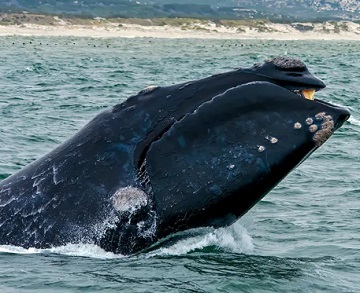 Maine lobstermen are signaling their hesitation to participate in a multimillion-dollar program the state is launching to test new ropeless technology that the federal government soon may require to protect the endangered North Atlantic right whale. Lobstermen have been largely unhappy with the regulations, fearing that the regulations will destroy the lobstering industry as they know it. Maine’s congressional delegation succeeded in securing legislative approval for a reprieve that stalls the regulations from going into effect until Jan. 1, 2029. Industry groups also have succeeded in taking NOAA to court, where the regulations are still tied up. Even so, the clock is ticking and the Department of Marine Resources wants to be prepared for what it expects is an inevitable regulation. more, >>click to read<< 06:31
Maine lobstermen are signaling their hesitation to participate in a multimillion-dollar program the state is launching to test new ropeless technology that the federal government soon may require to protect the endangered North Atlantic right whale. Lobstermen have been largely unhappy with the regulations, fearing that the regulations will destroy the lobstering industry as they know it. Maine’s congressional delegation succeeded in securing legislative approval for a reprieve that stalls the regulations from going into effect until Jan. 1, 2029. Industry groups also have succeeded in taking NOAA to court, where the regulations are still tied up. Even so, the clock is ticking and the Department of Marine Resources wants to be prepared for what it expects is an inevitable regulation. more, >>click to read<< 06:31
NFWF grants support Maine lobster industry participation in alternative fishing gear testing
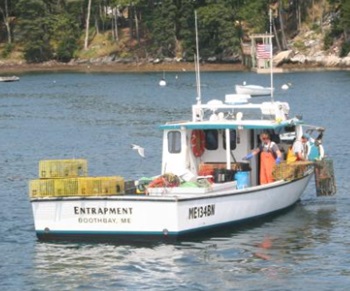 “Alternative gear, also known as “on demand” gear is a long way from being viable for fishermen or for whales,” said DMR Commissioner Patrick Keliher. “It is my goal to make sure we know what gear works, and more importantly what doesn’t work, so when future draft federal regulations come forward, we can draw on the real-world experience of fishermen when determining what the next steps should be.” One award of $1,999,992 will support the evaluation of acoustic geolocation systems that locate gear on the bottom without the benefit of surface buoys which are part of traditional gear configurations. Regional partners will include the Island Institute, Maine Center for Coastal Fisheries, Maine Coast Fishermen’s Association, the Sunrise County Economic Council, and the Gulf of Maine Lobster Foundation. more, >>click to read<< 06:09
“Alternative gear, also known as “on demand” gear is a long way from being viable for fishermen or for whales,” said DMR Commissioner Patrick Keliher. “It is my goal to make sure we know what gear works, and more importantly what doesn’t work, so when future draft federal regulations come forward, we can draw on the real-world experience of fishermen when determining what the next steps should be.” One award of $1,999,992 will support the evaluation of acoustic geolocation systems that locate gear on the bottom without the benefit of surface buoys which are part of traditional gear configurations. Regional partners will include the Island Institute, Maine Center for Coastal Fisheries, Maine Coast Fishermen’s Association, the Sunrise County Economic Council, and the Gulf of Maine Lobster Foundation. more, >>click to read<< 06:09
Lobsterman finds body off Down East coast
 A Jonesport lobsterman on Monday found a body in the ocean near Addison. The Maine Marine Patrol has recovered the body, and it is being transported to the Maine medical examiner’s office in Augusta for identification, Maine Department of Marine Resources spokesperson Jeff Nichols said. Nichols declined to comment on whether the body may be that of Tylar Michaud, a Steuben lobsterman who went missing on July 21 after he went out to haul traps near Petit Manan Island. Charles Kelley, a Steuben lobsterman and pastor at a local church who led Sunday’s service for Michaud, said that while an official identification of the body has not been made, people close to the family and who were involved in the extensive search believe it is Michaud. >click to read< 17:41
A Jonesport lobsterman on Monday found a body in the ocean near Addison. The Maine Marine Patrol has recovered the body, and it is being transported to the Maine medical examiner’s office in Augusta for identification, Maine Department of Marine Resources spokesperson Jeff Nichols said. Nichols declined to comment on whether the body may be that of Tylar Michaud, a Steuben lobsterman who went missing on July 21 after he went out to haul traps near Petit Manan Island. Charles Kelley, a Steuben lobsterman and pastor at a local church who led Sunday’s service for Michaud, said that while an official identification of the body has not been made, people close to the family and who were involved in the extensive search believe it is Michaud. >click to read< 17:41
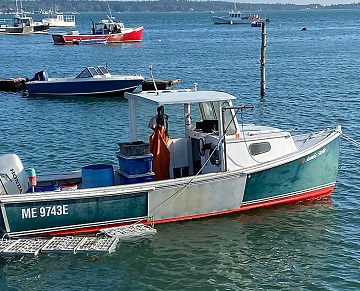
Maine bill to pay lobstermen to test new gear gets initial Senate approval
The bill seeks to set aside $1 million a year for the next two years to help lobstermen comply with federal regulations that could kick-in within six years. Following the Senate vote on Tuesday, bill sponsor Sen. Eloise Vitelli (D-Arrowsic) said federal regulators have “targeted Maine’s lobster industry as a scapegoat.” “The bipartisan fight against these untenable regulations is ongoing,” she said in a statement. “This bill will help make sure that lobstermen are prepared for what might be on the horizon.” Vitelli’s bill, which faces additional House and Senate votes, would provide stipends to reimburse lobstermen for time they spend testing gear. >click to read< 09:05
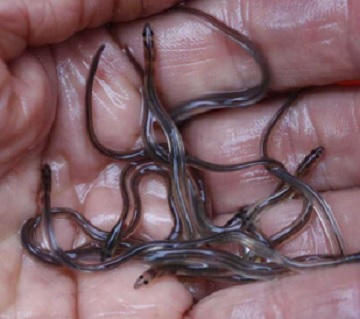
Baby eels remain one of America’s most valuable fish after strong year in Maine
Baby eels, called elvers, are often worth more than $2,000 per pound because of how valuable they are to Asian aquaculture companies. That makes them one of the most valuable fish species in the U.S. They’re raised to maturity so they can be used in Japanese food, some of which is sold in the U.S. in unagi dishes at sushi restaurants. The elvers have again been worth more than $2,000 per pound at the docks this year, according to the Maine Department of Marine Resources. South Carolina is the only other state in the country with a fishing industry for baby eels, and that state’s fishery is much smaller. >click to read< 09:12
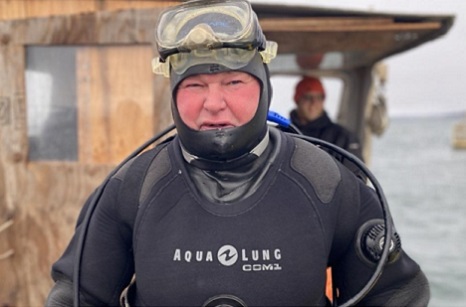
Green Gold Rush: What happened to Maine’s once-robust sea urchin industry?
In the United States’ easternmost city, you’ll find Paul Cox and his crew working early on the water. In late winter, they’re after a spikey, green, and otherwise inedible sea creature (besides the gonads): the green sea urchin. Alone and in often murky water that requires a flashlight, he scoops hundreds of pounds of sea urchin into yellow nets. His crew, Paul and Jevin, sort the urchin above water. Cox said he started to dive for sea urchin in the ’90s, not long before the state cut off any new licenses  to prospective fishermen. After the ’90s, no one could get a new sea urchin license. Now everyone who dives for urchin is in their 60s and 70s, with little hope on the horizon for new licenses seeing how the sea urchin has lost so much of its habitat because of climate change and invasive species. Photos,Video, >click to read< 10:54
to prospective fishermen. After the ’90s, no one could get a new sea urchin license. Now everyone who dives for urchin is in their 60s and 70s, with little hope on the horizon for new licenses seeing how the sea urchin has lost so much of its habitat because of climate change and invasive species. Photos,Video, >click to read< 10:54
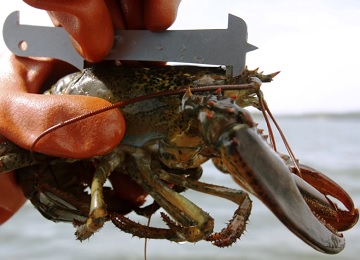
Regulators approve new lobster size limits in Maine to preserve young population
An Atlantic States Marine Fisheries Commission board has approved new measures that could change the minimum and maximum catch sizes for lobster in certain parts of Maine. The fisheries commission said it will gradually implement changes to measurement sizes by fractions of an inch in certain parts of the Gulf of Maine — but only if it observes a 35% decline in the young lobster population through trawl and trap survey data. Recent assessments have shown a 23% decline in juvenile lobsters, said Pat Keliher, commissioner of the Maine Department of Marine Resources. >click to read< 09:01
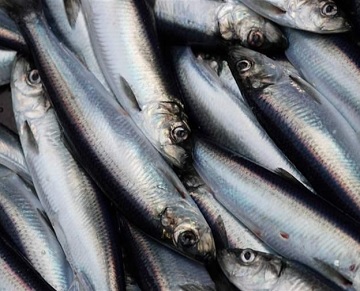
Herring fishermen get money after decline of fish, quota cuts
Fishermen in Maine’s historic herring fishing business will receive money from the federal government to help cope with a decline in the fish’s population that has caused the industry to struggle. The government has appropriated $7 million for the fishermen, the Maine Department of Marine Resources said Wednesday. Atlantic herring were found to be overfished via a 2020 scientific assessment, and fishing quotas were slashed after that. The nation’s catch of Atlantic herring has plummeted in the face of quota cuts and concern over the health of the stock. The loss of herring has led to a bait crunch for lobster fishermen, who have had to seek other sources of bait for traps. >click to read< 09:26








